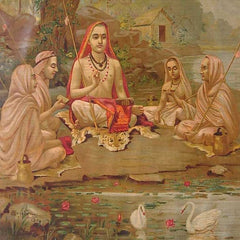Role of Storytelling in Jyotish
Astrology - Living Mythology
Do you ever think about how astrology first began? The first horoscope certainly was not calculated on a computer. In fact, if the founding fathers of astrology could see how their modern counterparts mechanically produce horoscopes on their laser printers, they would probably roll over in their graves. In ancient times, astrologers were actually astronomers, and they made their calculations directly, by looking up at the heavens. For thousands of years, these ancient seers watched the night sky and grouped the stars into crabs, centaurs, twins, deer and other symbols. They meditated deeply and began to tell the stories of the gods they saw in the heavens. These stories were told and retold down through the ages around campfires, in temples, and finally, some of them were written down.
I was reminded of this story-telling foundation of astrology last month when I went camping with three friends at a remote mountain lake in the California Sierras. One of the three, Marc, brought his telescope and was hoping to take advantage of the high visibility caused by the thin mountain atmosphere. We were all looking forward to seeing Jupiter, Saturn and possibly a few distant galaxies through the telescope, so we only put up a minor fuss when Marc announced that we would have to get up at 3:30 a.m. for the privilege.
And get up we did. By the time we had wiped the sleep away, donned our sneakers, and groaned a few disparaging remarks in Marc's direction, he was ready. He had already zeroed in on Jupiter, set the tracking device on his telescope so that the earth's rotation would not pull it out of the field of view, and was prepared to give us each a peek. I yawned and gently pressed my eye to the telescope. What I saw was a pleasant surprise. Jupiter was shining clearly, as expected, in the center of the field of vision, but around it I could also see eight of its moons. Jupiter, the ruler of progeny, seemed to be surrounded by his children. I was reminded of how important children were to Jupiter in the ancient myths, and how he once even lost his balance over the infidelity of his wife and her illegitimate child.
As the story goes: Jupiter, the preceptor of the gods, had a very beautiful wife named Tara. One day she was out walking when she came to the Moon's house. When the Moon saw her, he fell in love with her immediately. Tara also fell in love with the Moon and decided to move in with him. When Jupiter found out that Tara was with the Moon, he sent his disciples to bring Tara back, but Tara refused. Jupiter sent his disciples back several times, but each time they returned without Tara. Even when Jupiter went personally and tried to convince Tara to return, she would not come back to him.
This caused Jupiter to become very angry. He called the Moon "The brahman killer, gold thief, drunkard, he who marries another's wife." He also told the Moon that he was not fit to reside in the abode of the gods. "Unless you return my wife," Jupiter said, " I will curse you!" The Moon was not impressed and did not give in. He told Jupiter that Tara had come to him on her own and would leave him when she was no longer satisfied. This made Jupiter furious, so he went to Indra, the king of the gods, and asked him to help. Indra agreed and ended up going to war with the Moon.
Eventually, Brahma, the creator, intervened and convinced the Moon to return Tara to Jupiter. By this time, however, Tara was pregnant, and later gave birth to the beautiful, articulate, and charming child, Mercury. Of course, Jupiter is the significator of children in astrology, and he was particularly infatuated with Mercury. He convinced himself that Mercury was his own child and tried to convince the Moon as well. But the Moon also loved the golden colored child. This resulted in the world's first custody battle, with Jupiter and the Moon arguing over who was the real father of Mercury. They demanded that Tara name the real father. Tara would not, because Mercury was illegitimate. Finally Brahma (the Creator) questioned her and she confessed that the Moon was Mercury's real father.
As I continued to scan Jupiter's periphery for hints of another moon, I couldn't help but think of the wisdom of the ancient sages who intuited this story and those of other planets and constellations. These stories are part of a living mythology, linked personally to each of us through our horoscopes. They are not only stories of lust, greed, jealousy, and hatred, but also stories of courage, equanimity, compassion and enlightenment. They are stories about human foibles and virtues, meant for telling around campfires, and for telling our children. I sat back from the telescope. The full Moon was reflecting off the mountain peaks and its cool light was dancing gently on the mirror-calm alpine lake. I felt intoxicated, expanded, hypnotized by some ancient storyteller. "Maybe this is how it all started," I thought, "in campsites like this, on nights like this."

 James' assistant's name is Nicole, and she is the one who makes the appointments. She can be reached by phone at 530-265-8410 or email at james@jameskelleher.com. If Nicole is not available by phone, please leave a message. Be sure to leave your phone number, the best time to be reached and your email address.
James' assistant's name is Nicole, and she is the one who makes the appointments. She can be reached by phone at 530-265-8410 or email at james@jameskelleher.com. If Nicole is not available by phone, please leave a message. Be sure to leave your phone number, the best time to be reached and your email address.